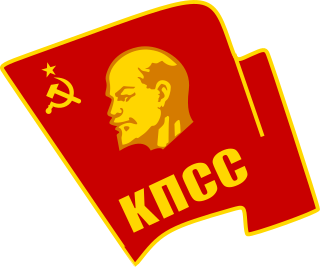Organ of the Committee of the Communist Party of Cuba
 |
|---|
|
Related topics |
The Politburo is the highest political organ of the Central Committee of the Communist Party of Cuba.
 |
|---|
The Politburo is the highest political organ of the Central Committee of the Communist Party of Cuba.
The Politburo of the Central Committee was established on 3 October 1965 when the United Party of the Cuban Socialist Revolution was transformed into the present-day Communist Party of Cuba. [1] It was established as the party's highest decision-making body between plenary sessions of the Central Committee, and its meetings were to be chaired by the First Secretary of the Central Committee. [1] Of the eight members elected to the Provisional Politburo three concurrently served as members of the Provisional Secretariat.
Alternate membership in the Politburo was abolished at the 4th Party Congress, held on 10–14 October 1991, with the intention of streamlining the party's decision-making process. [2]
| Term | Members | Period | Duration | |||
|---|---|---|---|---|---|---|
| Male | Female | Reelected | Start | End | ||
| Provisional | 8 | 0 | 8 | 3 October 1965 | 17 December 1975 | 10 years, 75 days |
| 1st | 13 | 0 | 13 | 22 December 1975 | 17 December 1980 | 4 years, 361 days |
| 2nd | 26 | 1 | 15 | 20 December 1980 | 4 February 1986 | 5 years, 46 days |
| 3rd | 23 | 1 | 10 | 7 February 1986 | 10 October 1991 | 5 years, 245 days |
| 4th | 22 | 3 | 16 | 14 October 1991 | 8 October 1997 | 5 years, 359 days |
| 5th | 22 | 2 | 8 | 10 October 1997 | 16 April 2011 | 13 years, 188 days |
| 6th | 15 | 1 | 11 | 19 April 2011 | 16 April 2016 | 4 years, 363 days |
| 7th | 13 | 4 | 9 | 19 April 2016 | 16 April 2021 | 4 years, 362 days |
| 8th | 11 | 3 | — | 19 April 2021 | Incumbent | 2 years, 294 days |

The Communist Party of the Soviet Union (CPSU), at some points known as the Russian Communist Party (Bolsheviks) and All-Union Communist Party (Bolsheviks), sometimes referred to as the Soviet Communist Party (SCP), and formerly known as the Bolshevik Party, was the founding and ruling political party of the Soviet Union. The CPSU was the sole governing party of the Soviet Union until 1990 when the Congress of People's Deputies modified Article 6 of the 1977 Soviet Constitution, which had previously granted the CPSU a monopoly over the political system. The party's main ideology was Marxism-Leninism.

The Communist Party of Vietnam (CPV), also known as the Vietnamese Communist Party (VCP), is the founding and sole legal party of the Socialist Republic of Vietnam. Founded in 1930 by Hồ Chí Minh, the CPV became the ruling party of North Vietnam in 1954 and then all of Vietnam after the collapse of the South Vietnamese government following the Fall of Saigon in 1975. Although it nominally exists alongside the Vietnamese Fatherland Front, it maintains a unitary government and has centralized control over the state, military, and media. The supremacy of the CPV is guaranteed by Article 4 of the national constitution. The Vietnamese public generally refer to the CPV as simply "the Party" or "our Party".

The Political Bureau (Politburo) of the Central Standing Committee of the Communist Party of Vietnam is the highest body of the Communist Party of Vietnam (CPV) in between gatherings of the National Congress and of the plenary sessions Central Committee. According to Party rules, the Politburo directs the general orientation of the government, and by that, it has dominant power in the politics of Vietnam.

The Central Committee of the Communist Party of Cuba (PCC) is the highest organ between two congresses.

The Central Committee of the Workers' Party of Korea is the highest organ between national meetings of the Workers' Party of Korea (WPK), the ruling party of North Korea. According to WPK rules, the Central Committee is elected by the party congress and the party conference can be conferred the right to renew its membership composition. In practice, the Central Committee has the ability to dismiss and appoint new members without consulting with the wider party at its own plenary sessions.

The officeholder of the post of first secretary presides over the work of the Central Committee of the Communist Party of Cuba (PCC), which is designated as "the organised vanguard of the Cuban nation" and as "the superior driving force of society and the State" by Article 5 of Cuba's constitution. The PCC Central Committee, the Party's highest political-executive organ between convocations of the party congress, has the right to elect and dismiss the first secretary at one of its sessions. The first secretary is responsible for leading the work of the Secretariat, the Party's highest executive organ, and chairing the sessions of the Politburo, the Party's highest political organ. The current first secretary is Miguel Díaz-Canel, elected by the 1st Session of the 8th Central Committee on 19 April 2021, and he concurrently serves as president of Cuba.

The Communist Party of Cuba is the sole ruling party of Cuba. It was founded on 3 October 1965 as the successor to the United Party of the Cuban Socialist Revolution, which was in turn made up of the 26th of July Movement and Popular Socialist Party that seized power in Cuba after the 1959 Cuban Revolution. The party governs Cuba as an authoritarian one-party state where dissidence and political opposition are prohibited and repressed. The Cuban constitution ascribes the role of the party to be the "leading force of society and of the state".

The Secretariat of the Workers' Party of Korea, formerly known as the Executive Policy Bureau (2016–21), manages the work of the Politburo of the Workers' Party of Korea and its Presidium. The General Secretary leads the work of the Secretariat, and the body is composed of several members.

The Political Bureau of the Central Committee of the Communist Party of the Soviet Union, or Politburo was the highest political body of the Central Committee of the Communist Party of the Soviet Union and defacto a collective presidency of the USSR. It was founded in October 1917, and refounded in March 1919, at the 8th Congress of the Bolshevik Party. It was known as the Presidium from 1952 to 1966. The existence of the Politburo ended in 1991 upon the breakup of the Soviet Union.

The Central Committee of the Communist Party of the Soviet Union was the highest organ of the Communist Party of the Soviet Union between two congresses. According to party statutes, the committee directed all party and governmental activities. The Party Congress elected its members.
The organization of the Chinese Communist Party (CCP) is based upon the Leninist concept of democratic centralism.

The Secretariat is the highest executive organ of the Central Committee of the Communist Party of Cuba.
The 3rd Politburo of the Communist Party of Cuba (PCC) was elected in 1986 by the 1st Plenary Session of the 3rd Central Committee, in the immediate aftermath of the 3rd Party Congress.
The 4th Politburo of the Communist Party of Cuba (PCC) was elected in 1991 by the 1st Plenary Session of the 4th Central Committee, in the immediate aftermath of the 4th Party Congress.
The 6th Politburo of the Communist Party of Cuba (PCC) was elected in 2011 by the 1st Plenary Session of the 6th Central Committee, in the immediate aftermath of the 6th Party Congress.
The 7th Politburo of the Communist Party of Cuba (PCC) was elected in 2016 by the 1st Plenary Session of the 7th Central Committee in the immediate aftermath of the 7th Party Congress.
The 8th Politburo of the Communist Party of Cuba (PCC) was elected in 2021 by the 1st Plenary Session of the 8th Central Committee in the immediate aftermath of the 8th Party Congress.
The 8th Secretariat of the Communist Party of Cuba (PCC) was elected in 2021 by the 1st Plenary Session of the 8th Central Committee in the immediate aftermath of the 8th Party Congress.
The 7th Secretariat of the Communist Party of Cuba (PCC) was elected in 2016 by the 1st Plenary Session of the 7th Central Committee in the immediate aftermath of the 7th Party Congress.
The 6th Secretariat of the Communist Party of Cuba (PCC) was elected in 2011 by the 1st Plenary Session of the 6th Central Committee in the immediate aftermath of the 6th Party Congress.
Articles and journals:
Books: